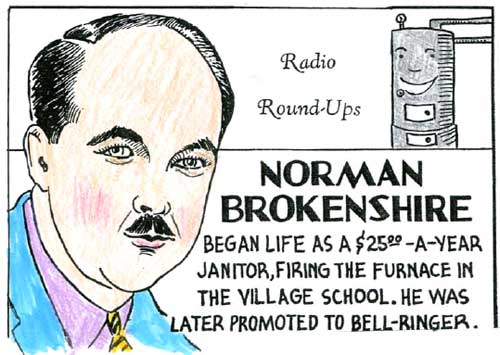|

This story was published in Radio Recall, the journal of the Metropolitan Washington Old-Time Radio Club, published six times per year.
Click here to return to the index of selected articles.
|
|
NORMAN BROKENSHIRE
by Jack French © 2011
(From Radio Recall, April 2011)
He would eventually become one of the best announcers on radio, and later, television, but Norman Brokenshire came from very humble beginnings. He was born on June 10, 1898 in the Canadian village of Murchison, Ontario, the youngest child among eleven siblings. His father, Griswald Brokenshire, was a lowly custodian in the stables of the Northwest Mounted Police barracks in nearby Moose Jaw. His mother took in washing and ironing in order to make ends meet.

All of the children were expected to seek part-time employment when they were not in school so they could contribute somewhat to the family’s meager financial resources. In grade school, Norman shoveled snow for neighbors and ran errands for old ladies, earning a few coins. His first “real” job was at age 12 when he was hired as the night janitor at his school, Renfrew Elementary, where he stoked the furnace each night. The job paid only $ 26 for the school year, but he was proud that he was employed and that he was making more money than two of his older brothers.
At age 14 Norman received a “promotion”; he was hired to be a bell ringer at the largest church in Murchison. That gave him a sizable raise, he was now making $ 32 a year. He rang the church bells every weekday (sunrise, noon, and sunset) plus four services on Sunday. In addition to building up his young muscles, he was learning a lot about liturgical music, which would stand him in good stead in his adult career as an announcer.
His family was too poor to send any of the children to college, so after graduating from high school, Norman drove a garbage truck for five years and saved up enough money to finance a move to New York City in 1920. There he found a low-level job at an advertising company, translating articles from Canadian into English.
For this firm, he was making only $ 7 a week, but to a young lad from Canada, life in the big city was exciting. In his off-duty hours, he taught himself to play the piano and the ukulele and he collected umbrella handles as a hobby.
One day in 1924 while delivering a parcel from the ad company to “Broadcast Central” on 42nd street, he saw an “help wanted” notice on the bulletin board. It read “Announcer: Must have microphone experience, be college graduate, knowledgeable about musical terms, own tuxedo.” Since Norman had none of those qualifications, he immediately applied for the job. Fortunately, his glib tongue and ready wit earned the respect of the station manager of WJZ/WJY who hired him on the spot.
As the newest announcer on the staff, making $ 13 a week, he did as many as ten shows a day, including a lot of “remotes.” He covered the funeral of William Jennings Bryan, the 1924 Democratic Convention, as well as the grand opening of Klink’s Screen Door Company.
Despite his modest success, he was convinced that radio had no future, so after two years he resigned his announcer job and took his ukulele to embark on a career in vaudeville in 1926. On the vaudeville circuit, he shared the bill with many show-biz wannabees who would never amount to anything: W.C. Fields, Fred Allen, Edgar Bergen, Mae West, and the Quimby Family Jugglers and their Dancing Dog, Dora.
No need to go on, this April Fool article ends here (alas, only 30% of the above piece is true.)
|